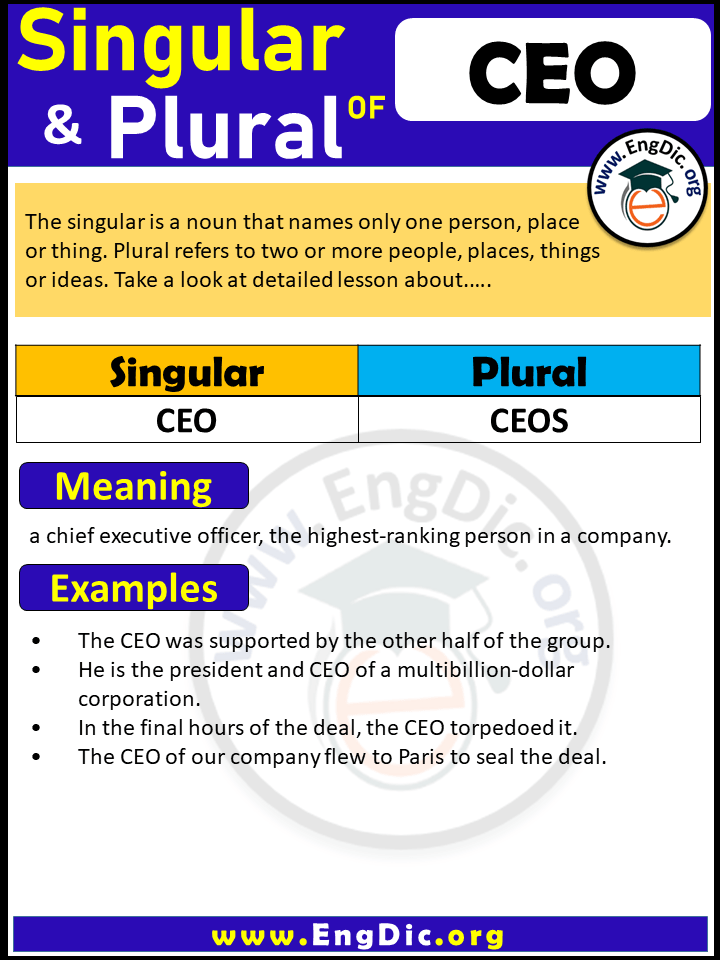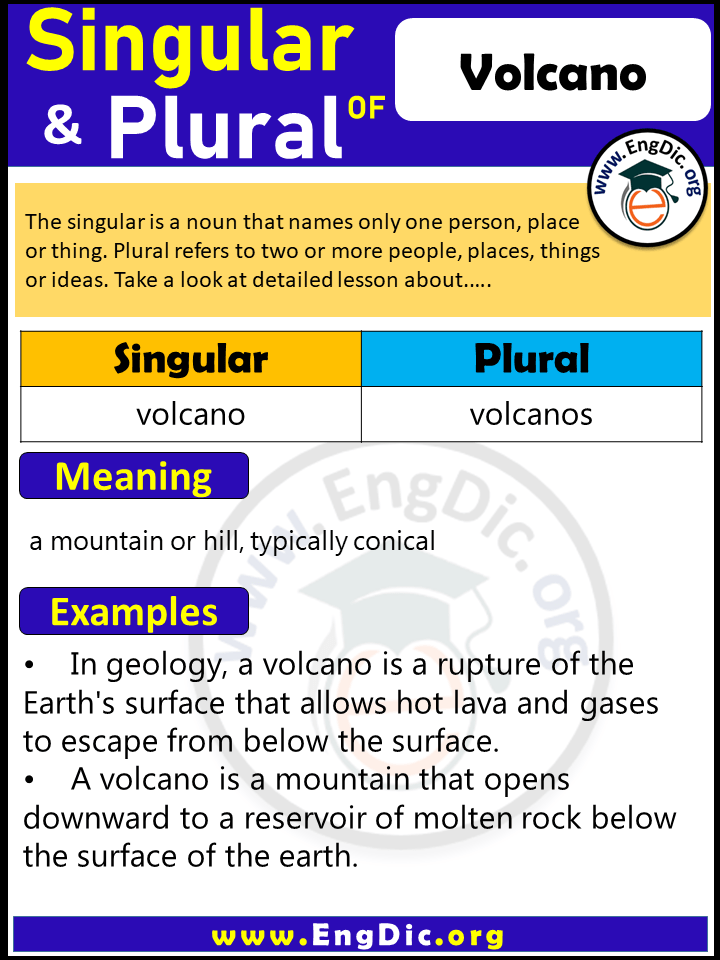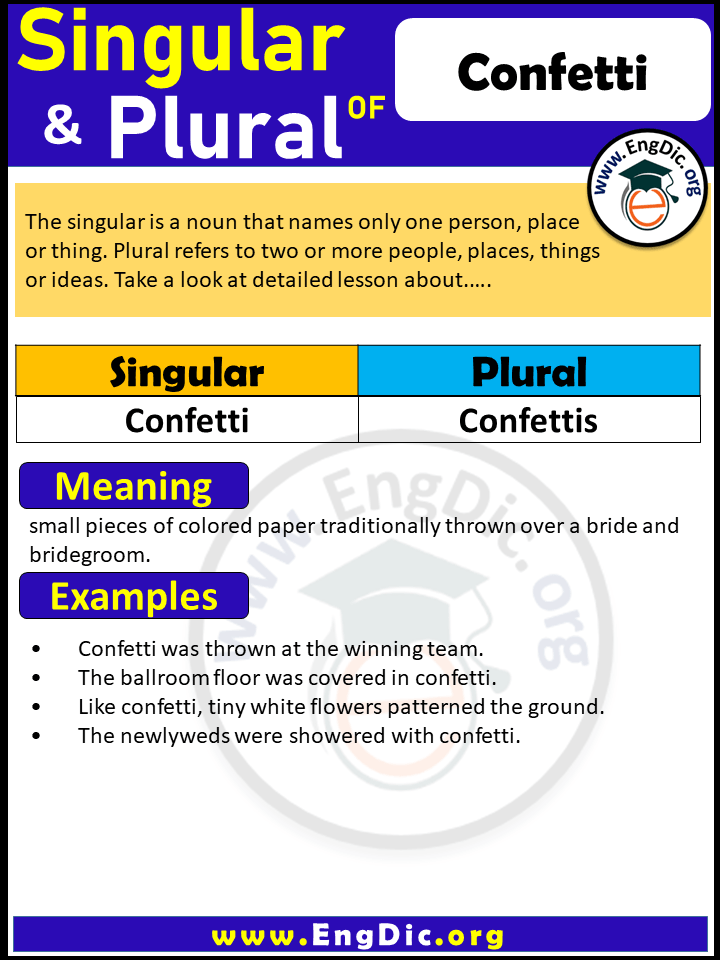What are Nouns?
Nouns are the bedrock of language, representing words that identify people, places, things, or ideas. They serve as the building blocks for constructing sentences and conveying meaning. By providing names, nouns enable us to communicate and articulate our thoughts, experiences, and perceptions. From tangible objects to intangible concepts, nouns encompass a diverse range of entities that shape our linguistic landscape.What are Singular and Plural Nouns?
Singular Noun:
The singular form of a word is used when referring to one object, while the plural form of a word is used when referring to more than one object. The word “individual” is an example of a singular noun.
Plural Noun:
Plural nouns are words that have more than one meaning. Some examples include “grades,” “chips,” and “cells.”
Note: You can Download PDF of this complete lesson at the END.
Now that we have established a solid understanding of nouns and the distinction between singular and plural forms, let us delve into practical examples of singular nouns and their contextual usage within sentences. This will further enhance your comprehension of the topic at hand.
Examples of Singular & Plural Nouns
Some examples of singular and plural nouns are:
- hat – hats
- woman – women
- frog – frogs
Examples of Singular Nouns in Sentences:
- Dog: The loyal dog wagged its tail.
- Book: She enjoyed reading a captivating book.
- Car: The shiny car sped down the highway.
- Tree: The tall tree provided shade on a hot day.
- Flower: The delicate flower bloomed in the garden.
- Child: The curious child asked endless questions.
- Cup: He sipped his coffee from a ceramic cup.
- Sun: The bright sun warmed the beachgoers.
- Pen: She signed the document with a blue pen.
- Laptop: He typed away on his sleek laptop.
Examples of Plural Nouns in Sentences:
- Dogs: The dogs played fetch in the park.
- Books: The library shelves were filled with books.
- Cars: They admired the sleek lines of the sports cars.
- Trees: The autumn colors adorned the trees in the park.
- Flowers: The garden was a riot of colorful flowers.
- Children: The children laughed and played in the playground.
- Cups: They poured tea into the delicate china cups.
- Suns: The two suns of the binary star system shone brightly.
- Pens: The students eagerly wrote with their pens.
- Laptops: The office was equipped with modern laptops for every employee.
7 Rules of Singular and Plural Nouns
In this article, we will also delve into the essential guidelines for transforming singular nouns into their plural counterparts. Explore the rules and strategies that facilitate the formation of plurals, empowering you to enhance your language proficiency and communicate effectively.Rule No 1:
If a word ends in the alphabet ‘o’ then we will add ‘es’ to make their plural form. Singular and Plural Noun Rules
Singular |
Plural |
Singular |
Plural |
| Buffalo | Buffaloes | Echo | Echoes |
| Hero | Heroes | Mango | Mangoes |
| Potato | Potatoes | Tomato | Tomatoes |
| Veto | Vetoes | Zero | Zeroes / Zeros |
Singular |
Plural |
Singular |
Plural |
| Auto | Autos | Kilo | Kilos |
| Photo | Photos | Piano | Pianos |
| Studio | Studios | ||
Rule No 2:
Add ‘s’ for making the Plural of these words.
Singular |
Plural |
Singular |
Plural |
| School | Schools | Room | Rooms |
| Girl | Girls | Road | Roads |
| Book | Books | Pen | Pens |
| Tree | Trees | Town | Towns |
| Pond | Ponds |
Rule No 3:
If a noun ends at these alphabets, then add ‘es’ to make their plurals. (x, z, s, ss, sh, ch)| Singular | Plural | Singular | Plural |
| Box | Boxes | Bus | Buses |
| Waltz | Waltzes | Flash | Flashes |
| Dish | Dishes | Fox | Foxes |
| Class | Classes | Brush | Brushes |
| Guess | Guesses | Lunch | Lunches |
| Ash | Ashes | Tax | Taxes |
Rule No 4: Singular and Plural Noun Rules
If a Word ends with the alphabet ‘y’ and there is a consonant before ‘y’ then replace ‘y’ with ‘ies’.
Singular |
Plural |
Singular |
Plural |
| Party | Parties | Family | Families |
| Theory | Theories | Lady | Ladies |
| Cherry | Cherries | Country | Countries |
| Pony | Ponies | Jelly | Jellies |
| Baby | Babies | City | Cities |
| Berry | Berries | Lily | Lilies |
| Fly | Flies | Penny | Pennies |
Rule no 5:
If a word ends with the alphabet ‘y’ and there is a ‘Vowel’ before ‘y’ then use add ‘s’ to make the plural of that word.
Singular |
Plural |
Singular |
Plural |
| Key | Keys | Boy | Boys |
| Way | Ways | Joy | Joys |
| Bay | Bays | Ray | Rays |
| Toy | Toys | Valley | Valleys |
Rule No 6:
If a word ends with ‘f’ or ‘fe’ then replace them with ‘ves’ to make plurals. Singular and Plural Noun Rules
Singular |
Plural |
Singular |
Plural |
| Wife | Wives | Elf | Elves |
| Leaf | Leaves | Shelf | Shelves |
| Calf | Calves | Wolf | Wolves |
| Thief | Thieves | Self | Selves |
| Life | Lives | Knife | Knives |
| Half | Halves | Scarves | Scarves |
Singular |
Plural |
Singular |
Plural |
| Chef | Chefs | Cliff | Cliffs |
| Roof | Roofs | Handkerchief | Handkerchiefs |
| belief | Beliefs | Chief | Chiefs |
Rule No 7:
To make Plural these nouns just change their vowels| Singular | Plural | Singular | Plural |
| Woman | Women | Foot | Feet |
| Tooth | Teeth | Mouse | Mice |
| Goose | Geese | Louse | Lice |
Note:
These words are the same in Singular and Plural Forms. Singular and Plural Noun Rules
Singular |
Plural |
Singular |
Plural |
| Sheep | Sheep | deer | deer |
| Fish | Fish | people | people |
| Hundred | Hundred | Thousand | Thousand |
| Swine | Swine | Aircraft | Aircraft |
| Offspring | Offspring | Innings | Innings |
| Dozen | Dozen | Score | Score |
| million | million | Billion | Billion |
100 Most Common Singular and Plural Nouns in English
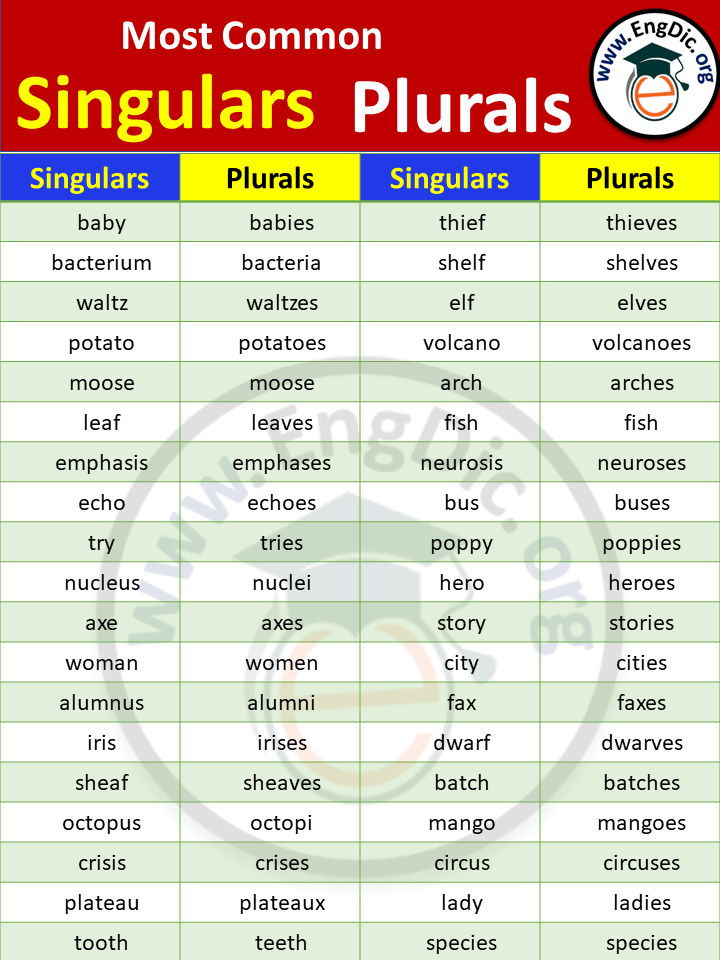
 Check Our A to Z List of Singular and Plural Nouns
Check Our A to Z List of Singular and Plural Nouns
| Singulars | Plurals | Singulars | Plurals |
| fly | flies | copy | copies |
| Son in law | Sons in-laws | scratch | scratches |
| dictionary | dictionaries | spy | spies |
| fungus | fungi | half | halves |
| curriculum | curricula | tax | taxes |
| stitch | stitches | hippopotamus | hippopotami |
| loaf | loaves | foot | feet |
| pass | passes | wash | washes |
| domino | dominoes | index | indexes |
| aquarium | aquaria | beach | beaches |
| sheep | sheep | wharf | wharves |
| person | people | cherry | cherries |
| motto | mottoes | series | series |
| tomato | tomatoes | mess | messes |
| hoax | hoaxes | child | children |
| thesis | theses | penny | pennies |
| oasis | oases | chateau | chateaux |
| abyss | abysses | life | lives |
| syllabus | syllabi | hoof | hooves |
| tornado | tornadoes | reflex | reflexes |
| wife | wives | quiz | quizzes |
| man | men | party | parties |
| memorandum | memoranda | nanny | nannies |
| baby | babies | thief | thieves |
| bacterium | bacteria | shelf | shelves |
| waltz | waltzes | elf | elves |
| potato | potatoes | volcano | volcanoes |
| moose | moose | arch | arches |
| leaf | leaves | fish | fish |
| emphasis | emphases | neurosis | neuroses |
| mouse | mice | Runner up | Runners up |
| echo | echoes | bus | buses |
| try | tries | poppy | poppies |
| nucleus | nuclei | hero | heroes |
| axe | axes | story | stories |
| woman | women | city | cities |
| alumnus | alumni | fax | faxes |
| iris | irises | dwarf | dwarves |
| sheaf | sheaves | batch | batches |
| octopus | octopi | mango | mangoes |
| crisis | crises | circus | circuses |
| plateau | plateaux | lady | ladies |
| tooth | teeth | species | species |
| atlas | atlases | deer | deer |
| kiss | kisses | analysis | analyses |
| cod | cod | brush | brushes |
| flush | flushes | church | churches |
| scarf | scarves | watch | watches |
| splash | splashes | knife | knives |
Related Faqs
Which Nouns Are Plural?
The word “noun” is the name of a person, place, or thing. Nouns are either singular or plural.
- Nouns that end in -s are always singular.
- Nouns that end in -es are always plural.
Why do we still use Singular Nouns when they can be made Plural?
Singular nouns are usually used when the name of an object is unknown to the writer. For example, “A book” or “a pen.”
However, they can be made plural and some people might be using them incorrectly.
The main reason for using singular nouns is that it’s easier to read and comprehend than a sentence with a plural noun. However, some people use them incorrectly because they have no idea how to make them plural.
What are the Advantages and Disadvantages of Using Singular or Plural Nouns?
Singular nouns are words that refer to one person, place, or thing. Plural nouns are words that refer to more than one person, place, or thing.
Singular nouns are typically used for people and things that have a singular identity (a single focus), such as “boy” or “apple.” Plural nouns can include people and things with multiple identities (multiple focuses), such as “boys” or “apples.”
Singular nouns typically refer to a single person, place, or thing. It is the most common type of word in English. Singular nouns can be used to refer to a singular object like “pen,” but they can also be used for an abstract concept like “love.”
Infographics (Singular and Plural Noun with Pictures)

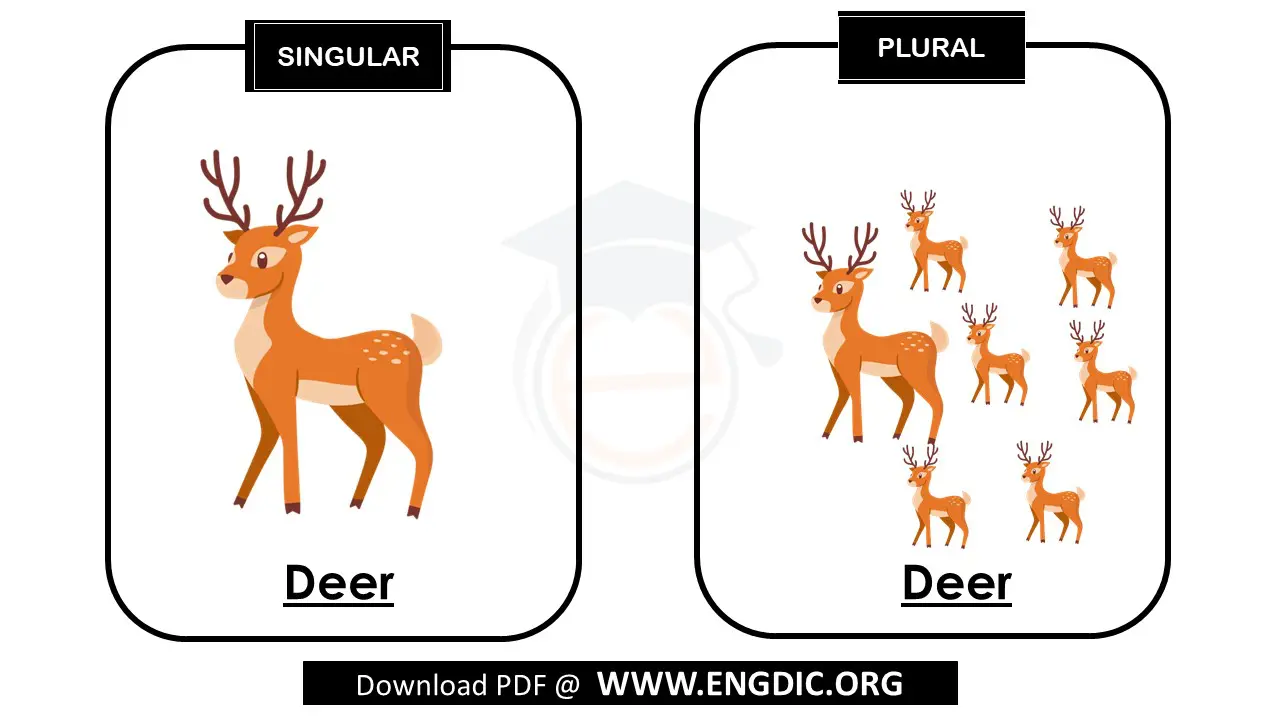
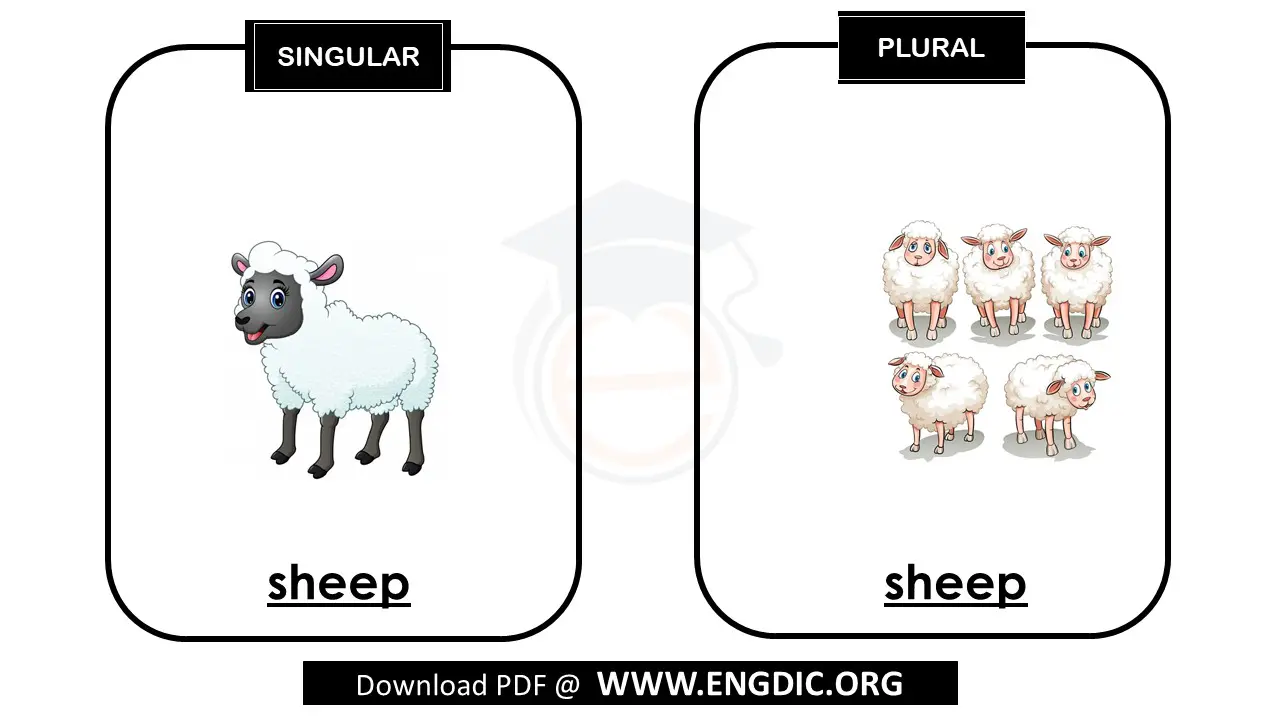
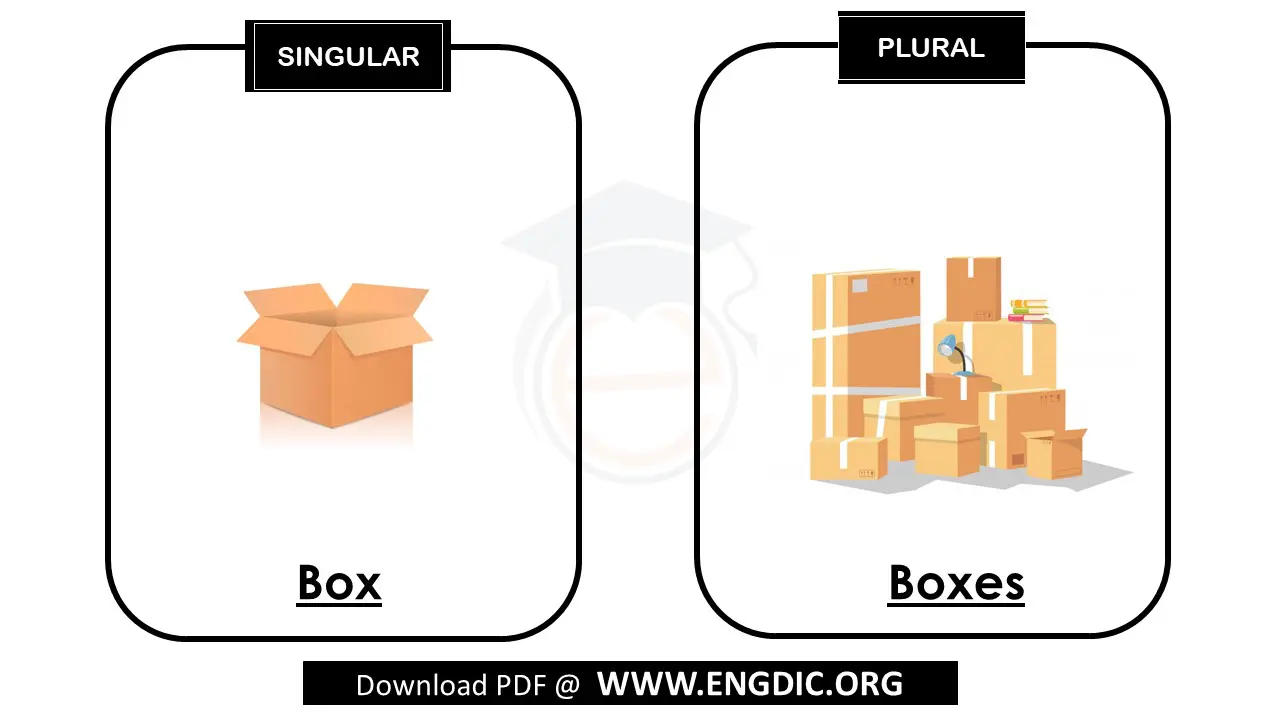
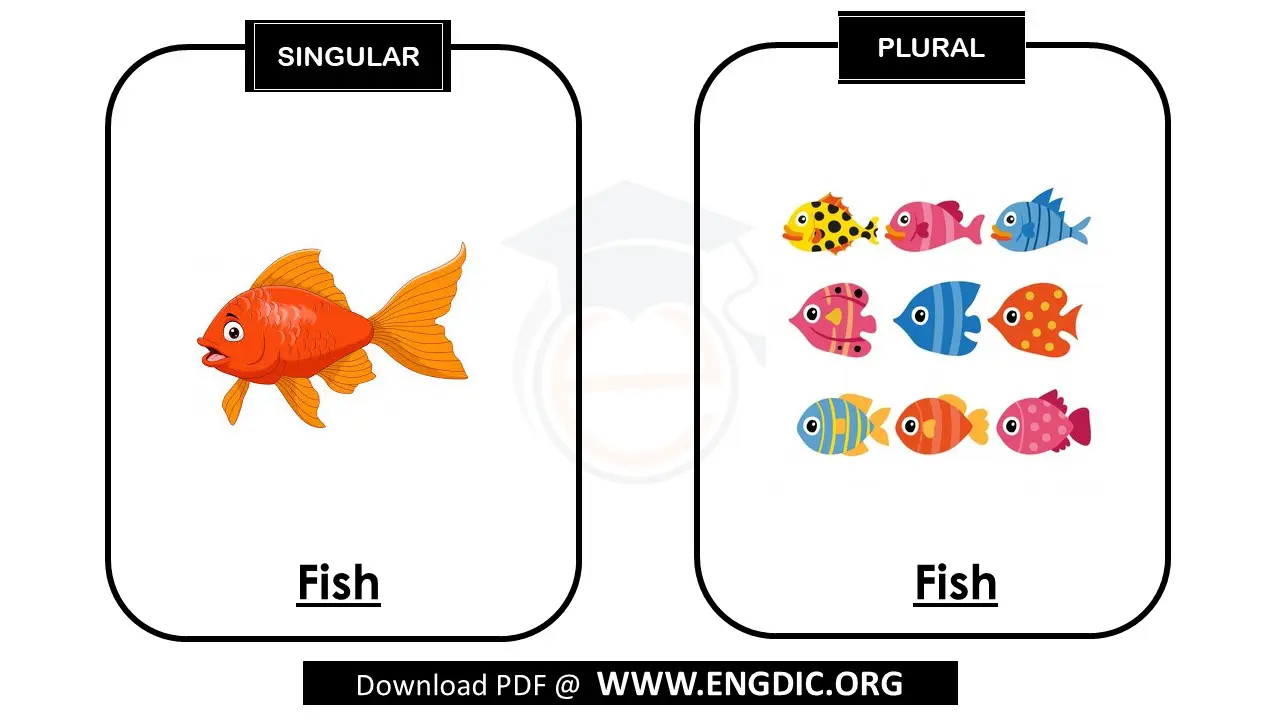

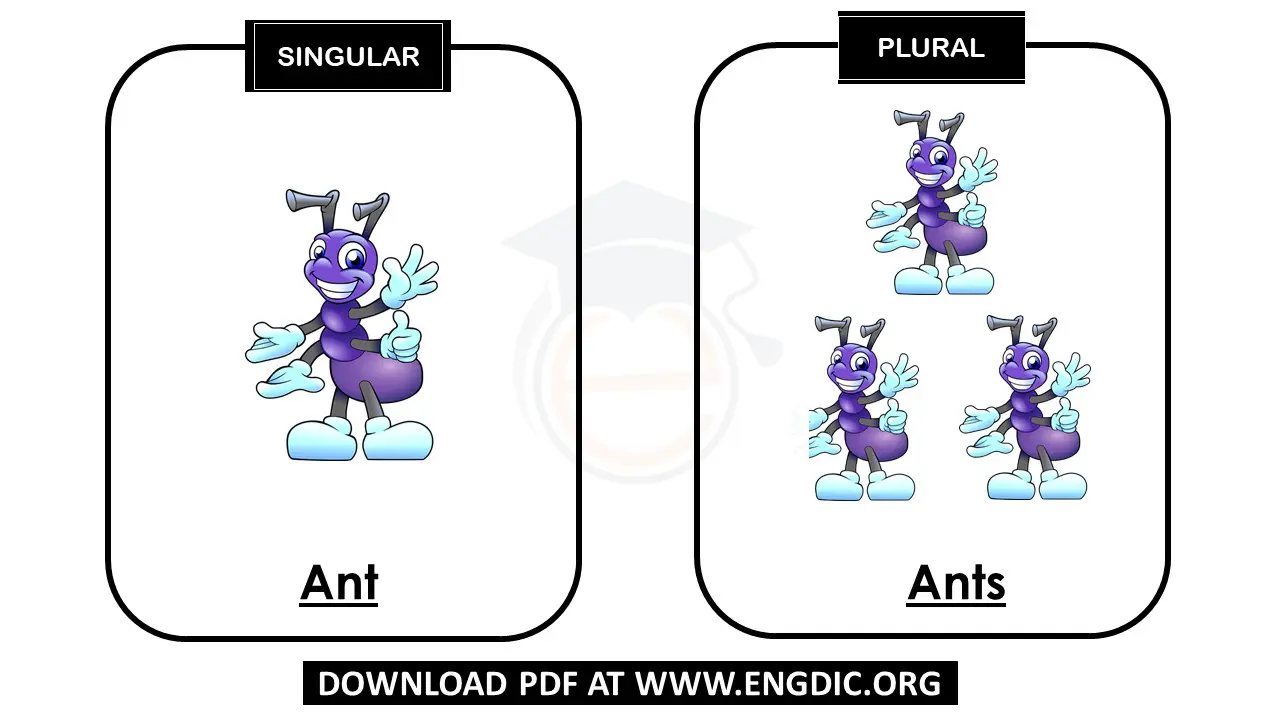
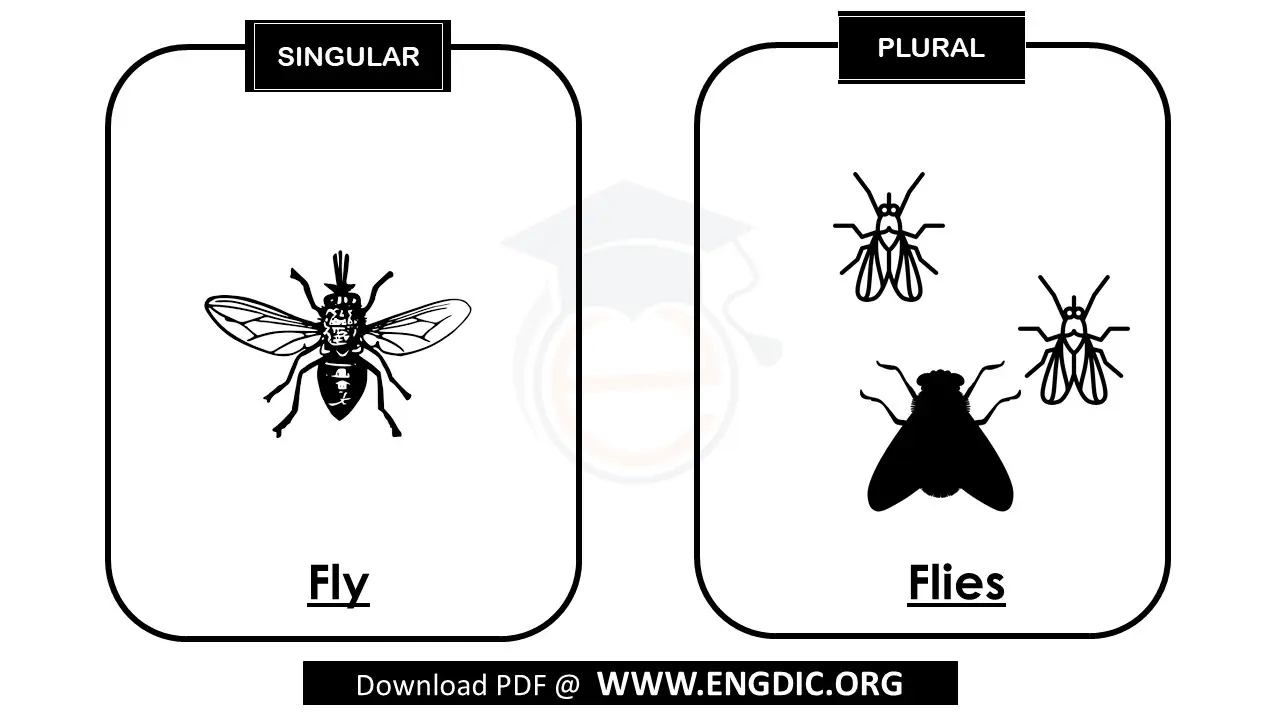
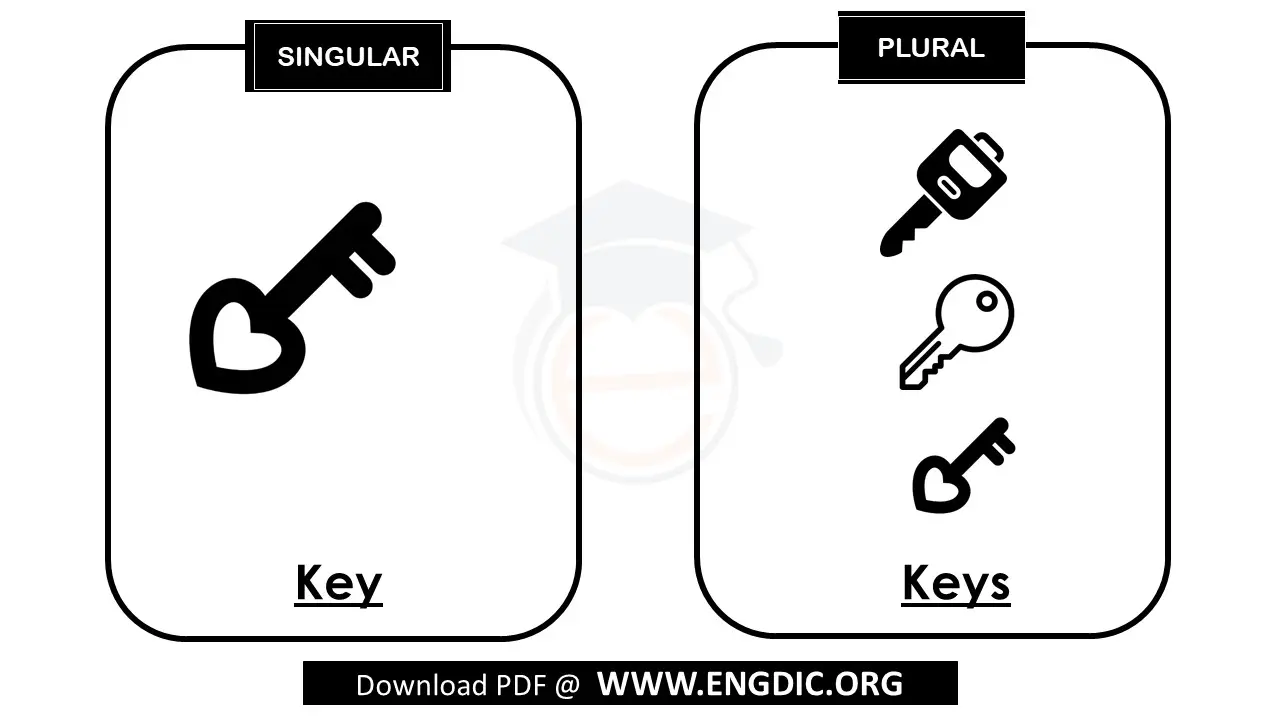
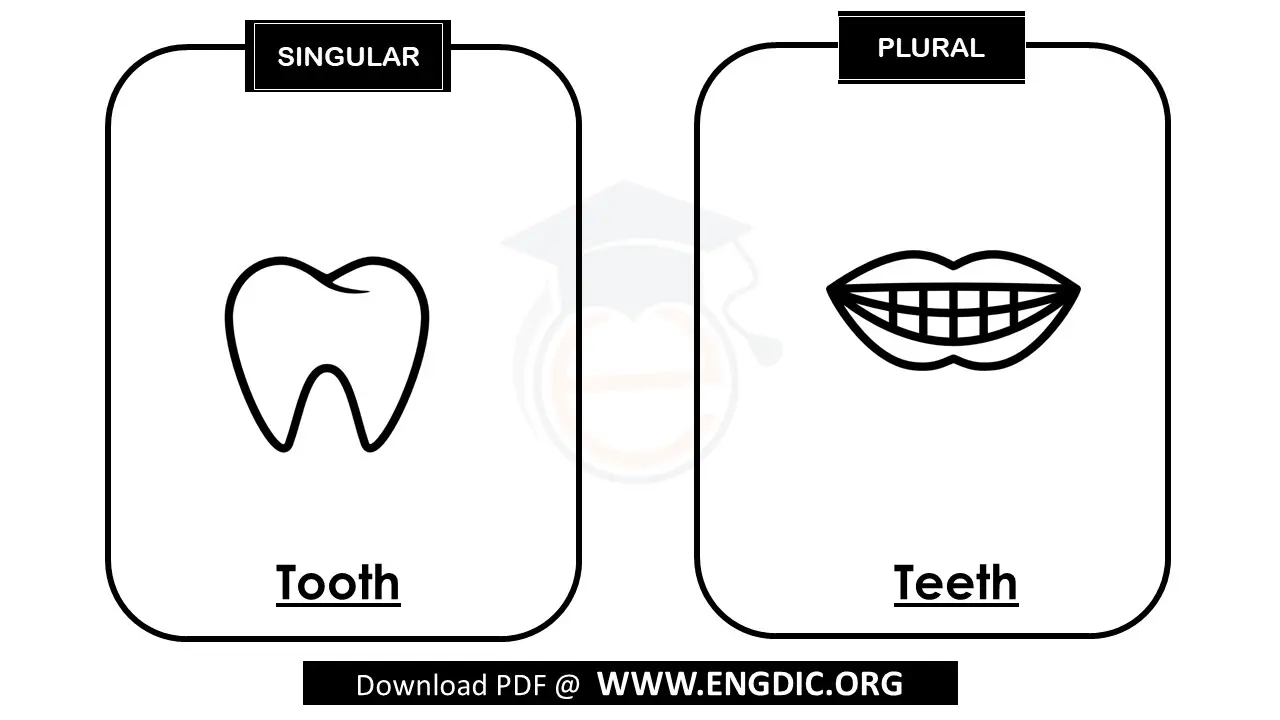
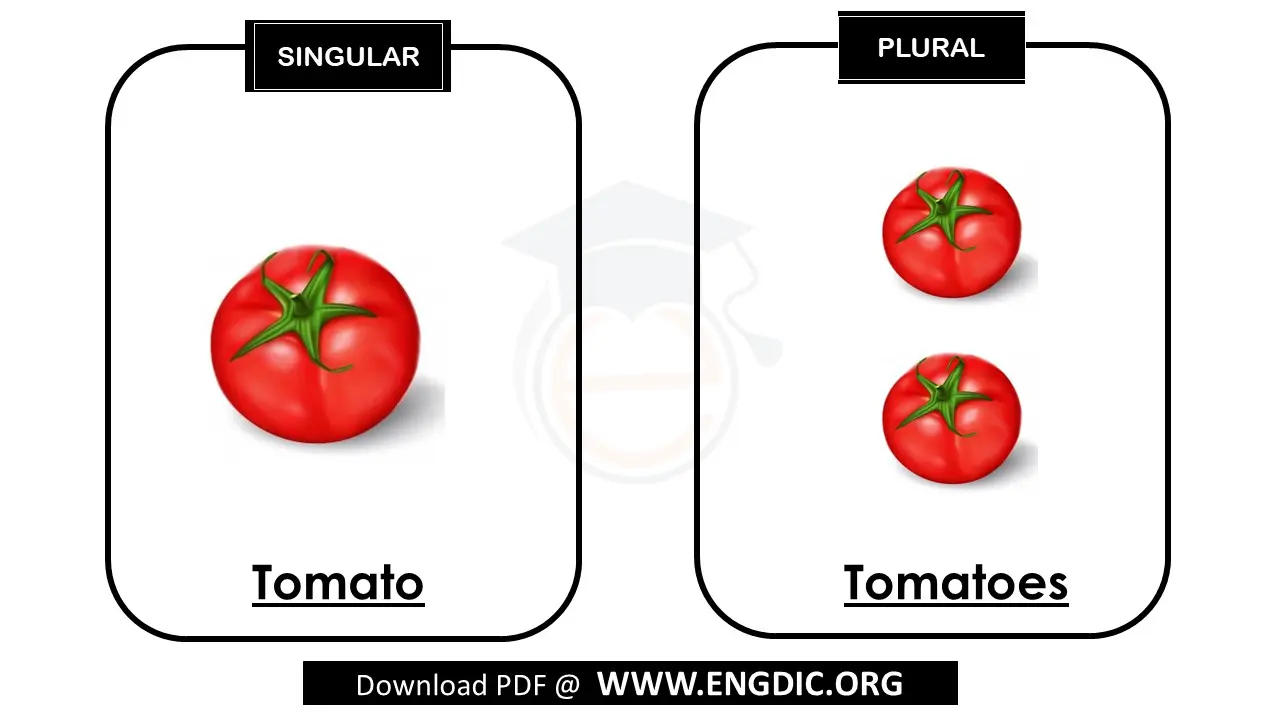
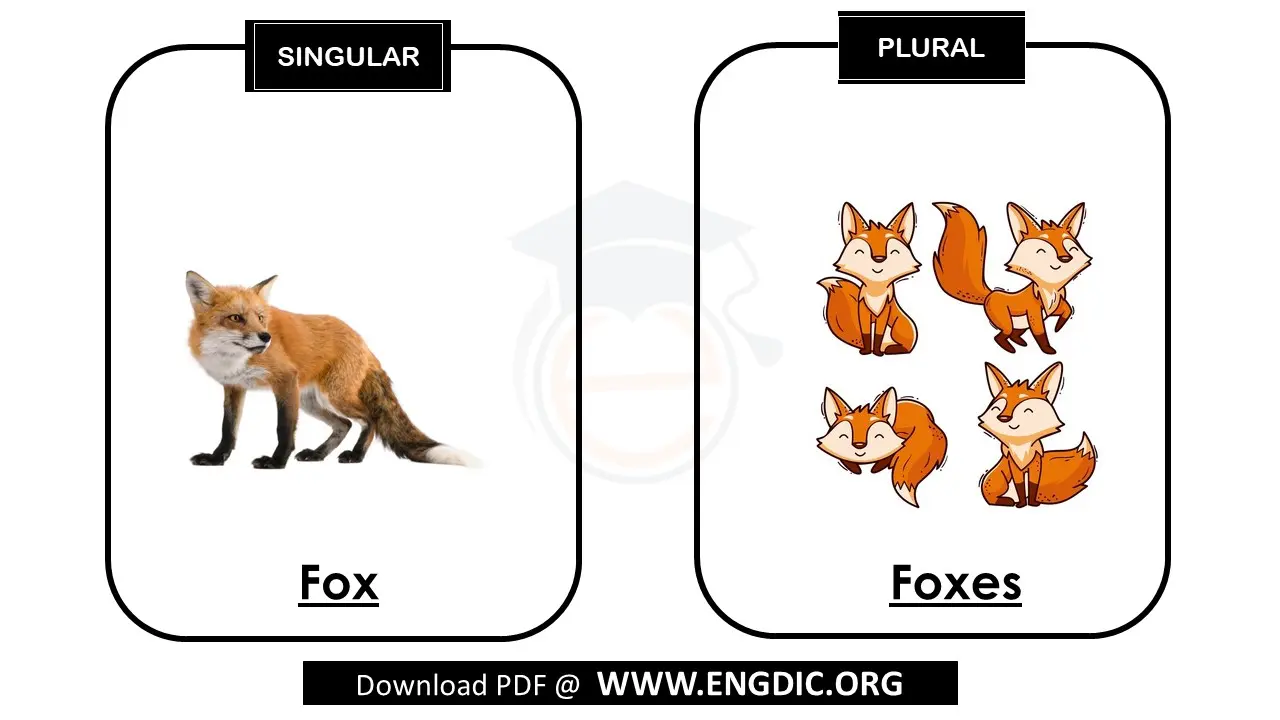

Singular and Plural Noun Rule
 Download this lesson of ” Singular and Plural Noun Rules PDF”.
Download this lesson of ” Singular and Plural Noun Rules PDF”.

